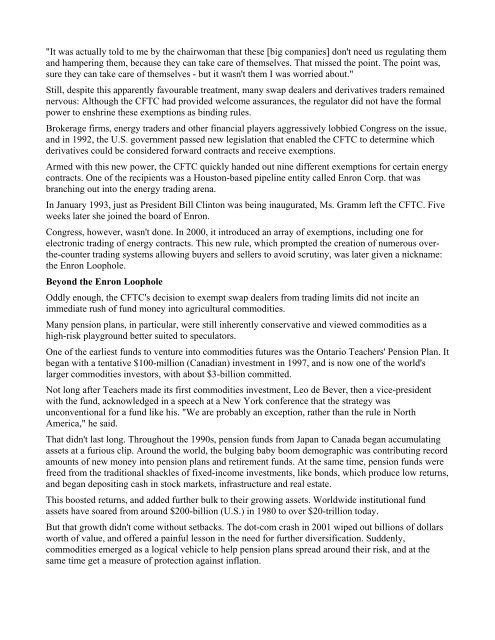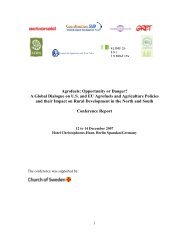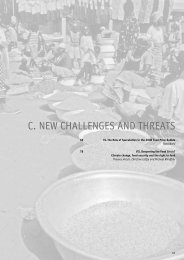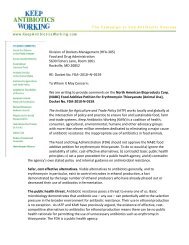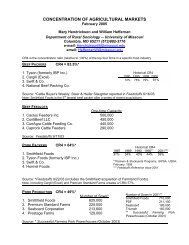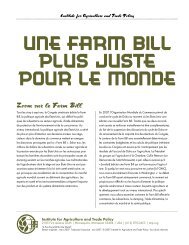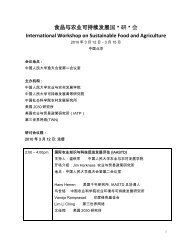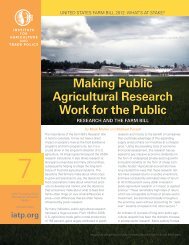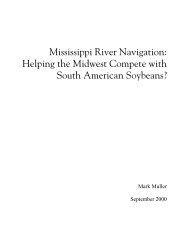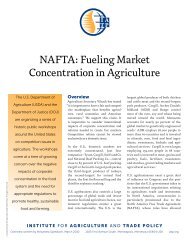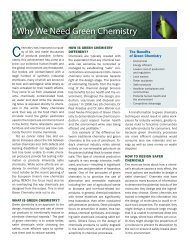Download this document - Institute for Agriculture and Trade Policy
Download this document - Institute for Agriculture and Trade Policy
Download this document - Institute for Agriculture and Trade Policy
You also want an ePaper? Increase the reach of your titles
YUMPU automatically turns print PDFs into web optimized ePapers that Google loves.
"It was actually told to me by the chairwoman that these [big companies] don't need us regulating them<br />
<strong>and</strong> hampering them, because they can take care of themselves. That missed the point. The point was,<br />
sure they can take care of themselves - but it wasn't them I was worried about."<br />
Still, despite <strong>this</strong> apparently favourable treatment, many swap dealers <strong>and</strong> derivatives traders remained<br />
nervous: Although the CFTC had provided welcome assurances, the regulator did not have the <strong>for</strong>mal<br />
power to enshrine these exemptions as binding rules.<br />
Brokerage firms, energy traders <strong>and</strong> other financial players aggressively lobbied Congress on the issue,<br />
<strong>and</strong> in 1992, the U.S. government passed new legislation that enabled the CFTC to determine which<br />
derivatives could be considered <strong>for</strong>ward contracts <strong>and</strong> receive exemptions.<br />
Armed with <strong>this</strong> new power, the CFTC quickly h<strong>and</strong>ed out nine different exemptions <strong>for</strong> certain energy<br />
contracts. One of the recipients was a Houston-based pipeline entity called Enron Corp. that was<br />
branching out into the energy trading arena.<br />
In January 1993, just as President Bill Clinton was being inaugurated, Ms. Gramm left the CFTC. Five<br />
weeks later she joined the board of Enron.<br />
Congress, however, wasn't done. In 2000, it introduced an array of exemptions, including one <strong>for</strong><br />
electronic trading of energy contracts. This new rule, which prompted the creation of numerous overthe-counter<br />
trading systems allowing buyers <strong>and</strong> sellers to avoid scrutiny, was later given a nickname:<br />
the Enron Loophole.<br />
Beyond the Enron Loophole<br />
Oddly enough, the CFTC's decision to exempt swap dealers from trading limits did not incite an<br />
immediate rush of fund money into agricultural commodities.<br />
Many pension plans, in particular, were still inherently conservative <strong>and</strong> viewed commodities as a<br />
high-risk playground better suited to speculators.<br />
One of the earliest funds to venture into commodities futures was the Ontario Teachers' Pension Plan. It<br />
began with a tentative $100-million (Canadian) investment in 1997, <strong>and</strong> is now one of the world's<br />
larger commodities investors, with about $3-billion committed.<br />
Not long after Teachers made its first commodities investment, Leo de Bever, then a vice-president<br />
with the fund, acknowledged in a speech at a New York conference that the strategy was<br />
unconventional <strong>for</strong> a fund like his. "We are probably an exception, rather than the rule in North<br />
America," he said.<br />
That didn't last long. Throughout the 1990s, pension funds from Japan to Canada began accumulating<br />
assets at a furious clip. Around the world, the bulging baby boom demographic was contributing record<br />
amounts of new money into pension plans <strong>and</strong> retirement funds. At the same time, pension funds were<br />
freed from the traditional shackles of fixed-income investments, like bonds, which produce low returns,<br />
<strong>and</strong> began depositing cash in stock markets, infrastructure <strong>and</strong> real estate.<br />
This boosted returns, <strong>and</strong> added further bulk to their growing assets. Worldwide institutional fund<br />
assets have soared from around $200-billion (U.S.) in 1980 to over $20-trillion today.<br />
But that growth didn't come without setbacks. The dot-com crash in 2001 wiped out billions of dollars<br />
worth of value, <strong>and</strong> offered a painful lesson in the need <strong>for</strong> further diversification. Suddenly,<br />
commodities emerged as a logical vehicle to help pension plans spread around their risk, <strong>and</strong> at the<br />
same time get a measure of protection against inflation.


